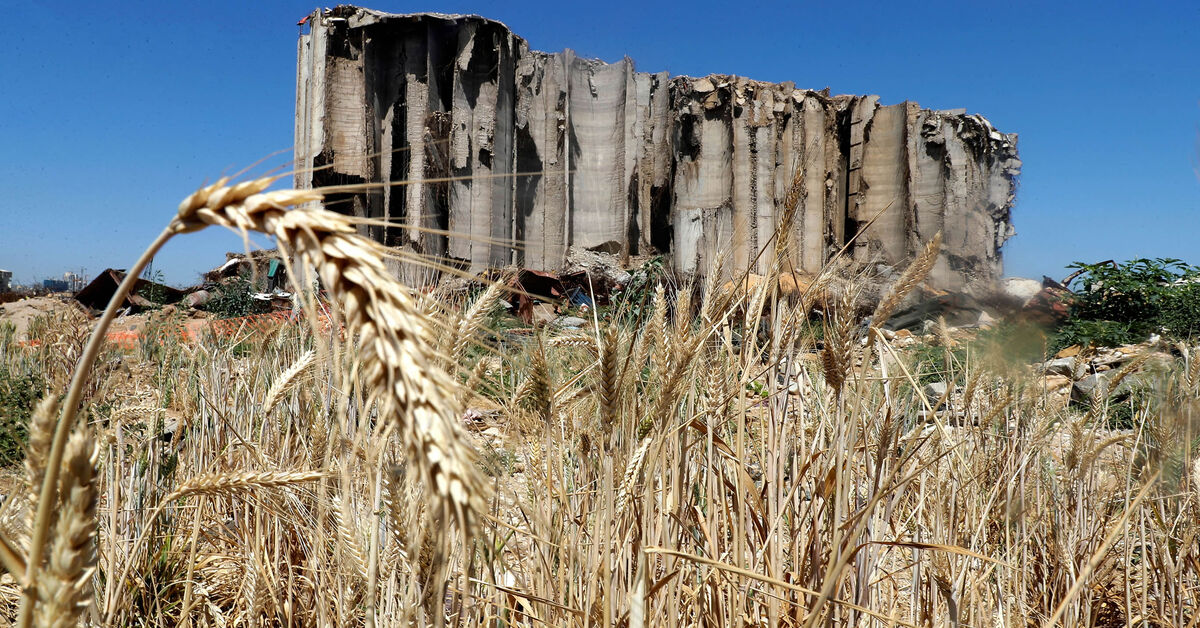
By MICHAEL TANCHUM — thenationalnews.com — As Russia’s two-week-old war against Ukraine has brought Lebanon’s wheat imports from the besieged Black Sea nation to a complete standstill, the government in Beirut is racing against the clock to avert a catastrophic food crisis. The conflict has set off a food security problem for many nations across the Middle East and North Africa – a region that relies on the Black Sea wheat-growing region as their bread basket – but Lebanon’s situation is uniquely precarious. Its severe lack of storage capacity combined with its economic state of hyperinflation is to blame. The situation is dire, and in the absence of immediate financial assistance, a food system collapse could happen in a matter of weeks or even days.
Lebanon needs to import about 50,000 metric tonnes of wheat each month to cover the nation’s demand for bread, and the government had relied on Ukraine to provide about two thirds of that wheat supply, amounting to more than 400,000 metric tonnes per year. Lebanon used to be able to store four months’ worth of wheat reserves, but the August 2020 Beirut Port explosion destroyed the country’s primary grain storage silos, removing 120,000 tonnes of storage capacity that has yet to be restored to this day. Lebanon’s other major port in Tripoli has no grain storage capacity, leaving the country to fend with only a one month’s storage by using warehouses owned by 12 mills.
The situation has put Lebanon’s Ministry of Economy and Trade on a monthly time-clock to secure wheat supplies, so that the country doesn’t run out of bread. On Tuesday, a Ukrainian ship carrying 11,000 tonnes of wheat – loaded before the war – arrived in Tripoli, providing about a week’s respite. Nonetheless, the monthly time-clock is quickly becoming a countdown to catastrophe. Even if Lebanon can secure consignments of wheat from other major suppliers, the increased shipping times due to longer ocean routes mean that new wheat supplies might not arrive before the clock runs out. While wheat loaded at Ukraine’s ports can reach Lebanon within seven days, shipments from more distant suppliers could take two to four times longer. The economy ministry is exploring the possibility of replacing Ukraine’s wheat with supplies from the US, Canada and India, but the shipping time from North America is about 25 days and that from the subcontinent is 14 days. In the event that Lebanon could purchase those alternative consignments, it is unclear how the country could pay for the added shipping costs and the higher prices.
Last August, the annual inflation rate hit 137.8 per cent, according to the Central Administration of Statistics, surpassing Zimbabwe and making the economic crisis one of world’s worst since the end of the Second World War. This meltdown has seen its currency lose at least 90 per cent of its value, three quarters of its citizens living below the poverty line, and food prices rising by 1,000 per cent, according to UN data. Lebanon’s central bank has already been taxed to its limits subsidising soaring wheat costs last year to ensure affordable bread for the masses now living in poverty. At the end of the third economic quarter of 2021, the price of soft wheat used in bread manufacturing stood at $271 per tonne, representing a 22 per cent year-on-year increase. As of Wednesday, the end-of-day settlement price for the March soft wheat contract on the Chicago Board of Trade stood at nearly $468 per tonne. According to Economy Minister Amin Salam, Lebanon was providing an almost 100 per cent subsidy on wheat – at $400 per tonne – requiring an outlay by the central bank of $20 million a month. “There is no capacity at the central bank to pay higher prices,” Mr Amin has flatly warned.
With Europe preoccupied helping beleaguered Ukraine and at-risk neighbouring countries such as Moldova to withstand a Russian escalation, it could fall to the US and the Gulf states, among others, to assist Lebanon in averting an all-out catastrophe by providing stopgap financial assistance. But beyond stopgap measures, Lebanon needs to change its time-clock by bolstering its food security through the expansion of its storage capacity and, ultimately, the development its nascent agri-tech sector. In this latter task, the UAE can exercise an important leadership role. On the day the Ukraine war broke out, Dubai hosted the first ever “Food for Future Summit and Global Agtech Expo”. The pioneering conference of agri-tech start-ups and thought leaders in the field of innovative and sustainable food production was conducted through a precedent-setting partnership between the UAE’s Ministry of Climate Change and Environment and the UN’s Food and Agriculture Organisation.
The UAE is a global leader in food logistics as well as investing in green energy innovation technologies. By facilitating the formation of a consortium of local, regional and international stakeholders to support the development of Lebanon’s innovative agri-tech sector, it could help advance that country’s long-term food security and promote greater regional co-operation in the Middle East. Beirut is running out of time, and it needs to act quickly if it is to stave off an oncoming hunger crisis.



